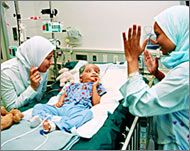Separated twins to return to Egypt
Ahmed and Mohamed Ibrahim arrived in the United States as babies conjoined at the heads but are returning home to Egypt as independent four-year-old boys.

“When we came here we don’t know what’s going to happen with the future; but now with the doctors’ and God’s help, we have two healthy kids,” their mother, Sabah Abu el-Wafa, said through a translator this week as they prepared for the trip home after three years in the United States.
The boys were born in 2001 in Egypt and came to Dallas a year later so doctors could determine whether they could be separated. Doctors said the surgery could result in the deaths of one or both boys, but their parents hoped it would allow their sons to one day lead normal lives.
With more than 50 medical personnel, including several neurosurgeons and plastic surgeons, the twins were separated in a 34-hour operation in October 2003.
Both boys have undergone extensive therapy and had surgery to reconstruct their skulls. But the bright-eyed boys who still wear helmets for protection are full of energy, bopping to Arabic music in the Dallas apartment they share with their parents.
Mohamed, who is walking now, is the dancer. The quieter Ahmed, who gets around with the help of a walker, prefers listening to the music while cuddled up with a family friend.
No more surgeries
|
“Even just the basic things like them sitting on their own, it took a while for them to be independent” Kristen DeMura, |
They have come a long way just to be moving around. Kristen DeMura, a paediatric physical therapist at Medical City Children’s, said that when she began working with the boys about five months after their separation, they needed to learn to sit up, crawl, roll over, stand and walk.
“Even just the basic things like them sitting on their own, it took a while for them to be independent,” she said.
The boys know words in Arabic and English, often answering a question in one language with a word from the other.
“Developmentally, they’re coming along fine,” says Dr Kenneth Salyer, a surgeon who founded the World Craniofacial Foundation that brought the boys to Dallas.
He said no additional operations were planned; but he will check on them again within a year to see if it is time to remove the helmets. Salyer said Mohamed’s skull was healed and solid, but the helmet offers protection.
“He wants to turn somersaults and his head isn’t ready for somersaults,” he said.
Ahmed still has one area on his skull that is soft, but it is gradually filling in, Salyer said.
Celebration
“We feel comfortable and secure enough that they can go home where they belong and be there and be safe,” Salyer said. “We’ve reached the point where they’ve been rehabilitated to not the final but to a place where they’re able to proceed on their own with help in Cairo.”
 |
|
The doctors have ruled out |
Their parents, who are from the small village of el-Homr in southern Egypt, are preparing for life in Cairo. The city will allow the boys to continue physical therapy.
Their parents want to find a private school where the twins can keep up their English.
But first the family will return to their village for a homecoming celebration.
The twins will be reunited with their two older siblings, nine-year-old Asma and seven-year-old Mahmoud, and they will meet their grandparents for the first time. The boys were whisked to Cairo for medical care shortly after their birth.
Their father, Ibrahim Mohammed Ibrahim, said that although he still did not know whether Mohamed would gain strength in his right arm, which is weaker, he has visions of his rambunctious son becoming a pilot. For the more thoughtful Ahmed, Ibrahim envisions a medical career.
Here their mother interjects. She could see Ahmed as a writer because he has such a good memory.